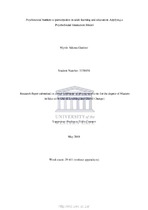| dc.contributor.advisor | Groener, Zelda | |
| dc.contributor.author | Adams-Gardner, Myrtle Grace | |
| dc.date.accessioned | 2019-02-07T06:58:45Z | |
| dc.date.available | 2019-02-07T06:58:45Z | |
| dc.date.issued | 2018 | |
| dc.identifier.uri | http://hdl.handle.net/11394/6555 | |
| dc.description | Magister Educationis (Adult Learning and Global Change) - MEd(AL) | en_US |
| dc.description.abstract | Adult learners’ perception of factors that are internal to their perceived control of their lives can be challenging to overcome when making a decision to participate in learning. There are complex relationships between psychological, and social barriers to participation in adult learning. Psychosocial barriers can deter adults’ participation in learning programmes. Understanding the nature of such barriers can enable policymakers, educators and adult learners create strategies to reduce such barriers in order to increase adults’ participation in adult learning. This study investigated the research question: What are adult learners’ perceptions of psycho-social factors that undermine participation in adult education and learning? The psycho-social interaction model adopted as a conceptual framework allowed the study to contextualise and analyse the effects of socio-economic status on the adult learner’s decision and readiness to participate. The model provided the broad segments of the adult learners’ pre-adulthood and adulthood learning years and through a thematic analysis attempted to analyse psychosocial factors that emerged as barriers to participatory behaviour in learning. An interview guide was used during a semi-structured interview. The study investigated a group of adult learners attending a non-formal learning programme in Central Johannesburg, South Africa. The selection of participants included 6 males and 4 females between 21 years to 49 years of age. The study findings showed that the adult learners’ perceptions of family support as well as the learning environment support are key enabling factors, which assist the adult learner to develop learning capabilities. Negative experiences with prior schooling was also described as a psychosocial barrier to participation. Age was a socio-economic variable that influenced the type of stimuli participants identified as a psycho-social factor which influenced their decision to take up further learning. Adult learners felt confident to successfully complete their current and future studies however perceived their learning press as a motivating factor that impacted their decision to participate. Findings also suggested that experiences of adult learners are unique to their specific context and educational planning can integrate ways to address enhancement of learning experiences for a diverse learner audience in non-formal learning programmes. The study concluded that while adult learners acquire social competencies through accessing non-formal programmes, further learning support is necessary to overcome the social and psychological complexities needed to develop basic academic learning capabilities. | en_US |
| dc.language.iso | en | en_US |
| dc.publisher | University of the Western Cape | en_US |
| dc.subject | Participation | en_US |
| dc.subject | Learning | en_US |
| dc.subject | Psycho-social factors | en_US |
| dc.subject | Adults | en_US |
| dc.subject | Adult learners | en_US |
| dc.title | Psychosocial barriers to participation in adult learning and education: Applying a psychosocial Interaction model | en_US |
| dc.rights.holder | University of the Western Cape | en_US |

